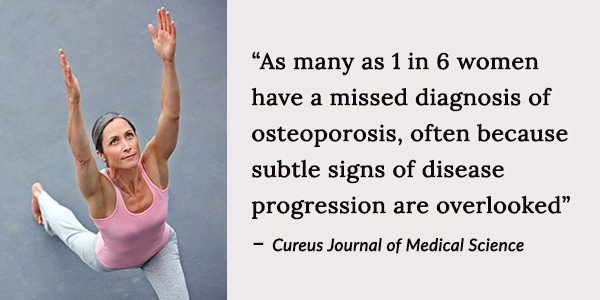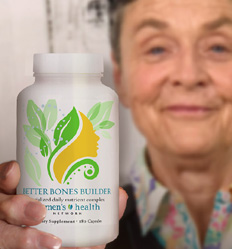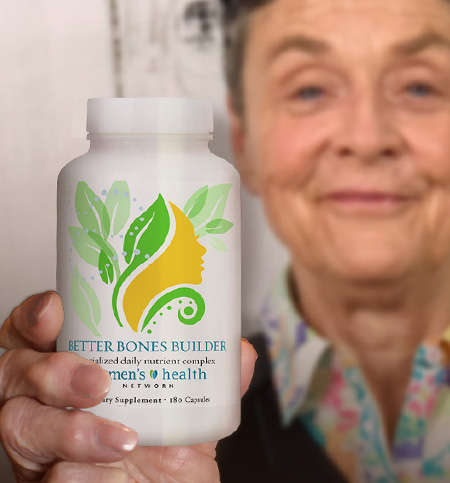Authored by Dr. Susan E. Brown, PhD
If you’re frightened by the prospect of osteoporosis or have already gotten an osteopenia diagnosis, you’re not alone. For many women, their first concerns about bone health occur when their doctors hand them prescriptions for bone drugs.

“I have a lot of the risk factors for osteopenia. But I no longer feel like I will be bent over like a pretzel tomorrow and am enjoying my new “take charge” approach to life.” – Joey, customer
While bone loss usually doesn’t present with the same kinds of obvious symptoms as many other health issues, there are several signs of silent bone loss. Just keep in mind that each is just one factor used to determine your risk of developing bone health issues.
Eight possible signs of bone loss:
Family history of bone issues
If one of your parents has had a bone fracture, your risk of having a break of your own is raised but it doesn’t mean you’re predetermined to have one. The factors that led to your parent’s fracture may not affect you and your bone health in the same way — or at all. Family history is only one consideration. And it does not make it inevitable that you will end up with a broken hip or poor bone health.
Low BMD
Low BMD (bone mineral density) is one measurement of bone health, though conventional medicine often uses it as a reason to put a patient on bone drugs. BMD is usually compared to one of two standards: the top BMD of young adults or the average BMD for your gender, size, age and race. If your BMD at midlife is judged against the BMD of a 25-year-old woman, it’s going to be much different, and that’s normal. Low BMD should be kept in perspective especially if other important aspects of bone health are fine.
Receding gums
Though gum issues can occur for a number of reasons, science has shown an association between receding gums and reduced BMD. When you lose bone in the jaw where your teeth are rooted, it can cause gums to pull back. If your gums have receded, and you have other risk factors for bone issues, consider taking steps now to support better bone health.
Decreased grip strength
Middle-aged women often notice that their ability to grip (opening jars, using exercise equipment, etc.) has diminished. Grip strength in women who are past menopause is directly connected to bone mineral density. It can also indicate the robustness of overall muscle strength. Improving muscle strength is straightforward and, because your muscles are anchored to your bones, will make your bones stronger too.
Weak and brittle fingernails
The state of your fingernails is affected by a lot of factors including yard work, chemical exposure and even dishwashing. But your fingernail status can be connected to bone health by way of nutrition. They both need the same nutrients to be strong and flexible. So if your fingernails look better after changing your nutrition, you’ll know that your bones are benefitting too.
Muscle aches, bone pain, leg and/or foot cramps
There are many possible reasons for muscle aches, bone pain and leg or foot cramps. But they all may indicate a deficiency in a key bone-health nutrient like Vitamin D. Vitamin D is absolutely essential for wellness, and critical for healthy bones. Low levels of calcium, potassium or magnesium can be linked to foot and leg cramps. These symptoms are invitations to make sure your intake of these nutrients is optimal.
Height loss
If you feel like you’re shrinking as you get older, you have a lot of company. The appearance of height can be affected by posture and muscle strength, but it won’t change your real height measurement. Fractures in the spine — which often happen without you knowing — can change your height, and are a sign of bone loss in the backbone. If you think this might be happening, check with your practitioner to find out what’s really going on.
Low overall fitness
We know for sure that osteoporosis is associated with your level of aerobic conditioning, strength in your muscles and how well you can balance in different situations. Your bones are an integral part of your body. So, if you become less active and don’t exercise, your skeleton will be affected negatively. Just know that if you do start to exercise and increase your activity level, you’ll automatically be improving your bone health too.
Bones respond to natural support
It is important to know where you fall on the wide spectrum of bone health. No matter what your bone health status — or your age — there are simple and natural ways to provide your bones with the support and specific nutrition they need to get stronger. Of course, under certain circumstances, bone medications serve a purpose. But you have more control over how you manage the health of your bones than you might imagine.
If you notice any of these eight signs, it’s worth following up with your healthcare practitioner because information is power. And know that you can take action on your own, too, because when it comes to the nutrients that bones need, you do have a choice.









